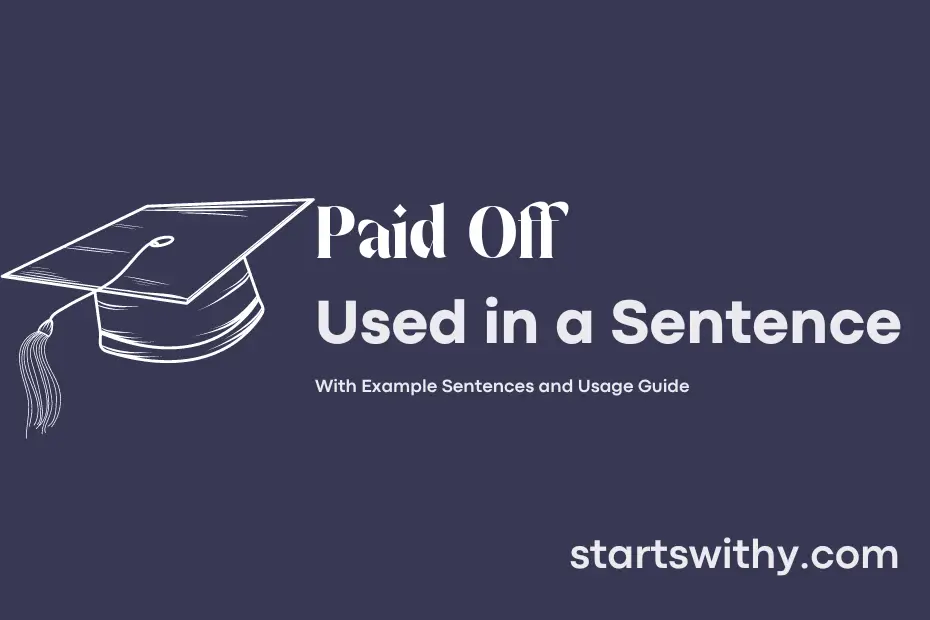Have you ever encountered a situation where your hard work and dedication finally “paid off”? To have an effort, investment, or risk result in success or a positive outcome is what is commonly meant when we say something “paid off.”
Achieving a desired goal or reaping the rewards of your labor after putting in the necessary effort and time is a satisfying experience that many can relate to. The feeling of seeing your persistence and determination lead to a successful outcome is what makes the phrase “paid off” so rewarding.
7 Examples Of Paid Off Used In a Sentence For Kids
- My father worked hard and paid off all his debts.
- The children studied every day and it paid off during the exams.
- We saved money for a long time and finally, it paid off when we went on a holiday.
- The farmers worked in the fields and their hard work paid off with a good harvest.
- She practiced singing every day and it paid off when she won a competition.
- The team trained for weeks and it paid off when they won the championship.
- The students listened carefully in class, and it paid off when they got good grades.
14 Sentences with Paid Off Examples
- Paid off all my outstanding fees and now I can finally enroll in the new semester.
- My hard work in my final year project paid off when I received a high score from my professor.
- I was nervous about my internship interview, but it paid off as I got selected for the position.
- I stayed up all night studying for my exam, and it paid off when I received an A grade.
- I was hesitant to invest in a professional certification, but it paid off as it helped me secure a job.
- My participation in extracurricular activities paid off when I was awarded a scholarship.
- I took a part-time job to save money for my education, and it has paid off as I can afford my textbooks now.
- I finally submitted my research paper, and the hours of editing and revising really paid off.
- After weeks of preparation, my presentation in front of the class paid off with positive feedback from my peers.
- I took a risk and started my own small business, and it has paid off with steady income.
- I applied for multiple internships, and it paid off when I was offered a position at a reputable company.
- I was up all night finishing my assignment, but it paid off as I received a good grade.
- I volunteered at a campus event, and it paid off as I made valuable connections with professionals in my field.
- My dedication to networking with alumni paid off when I was offered an opportunity for career mentorship.
How To Use Paid Off in Sentences?
Paid Off
When using Paid Off in a sentence, it is important to remember that this phrase is typically used to refer to debts that have been completely settled and no longer need to be paid. Here is a simple guide on how to correctly use Paid Off in a sentence:
-
Subject-Verb-Object Structure: Begin your sentence with the subject, followed by the verb, and then the object. For example: “I paid off my student loan.”
-
Past Tense: Remember that Paid Off is in the past tense, so it should be used to describe an action that has already been completed. For instance, “She paid off her credit card debt last month.”
-
Context: Make sure to provide context in your sentence so that the reader understands what has been paid off. For example, “They paid off their mortgage and now own their house outright.”
-
Use in a Negative Form: You can also use Paid Off in a negative form to indicate that something has not yet been settled. For instance, “I haven’t paid off the car loan yet.”
Keep these guidelines in mind when incorporating Paid Off into your sentences, and you will be able to communicate clearly and effectively about financial matters.
Conclusion
In conclusion, the concept of “paid off” signifies the successful achievement or result of an effort or investment. This phrase often reflects the positive outcome of hard work, dedication, or financial decisions. When a debt is paid off, a burden is removed, and one can experience a sense of relief and accomplishment. Similarly, when a long-term goal is achieved or a risk taken results in rewards, it is said to have paid off.
Ultimately, the expression “paid off” encapsulates the idea of reaping the benefits of one’s actions or decisions. It symbolizes the fulfillment of a purpose or the realization of a desired outcome, providing a sense of satisfaction and validation for the effort put into a particular endeavor.



